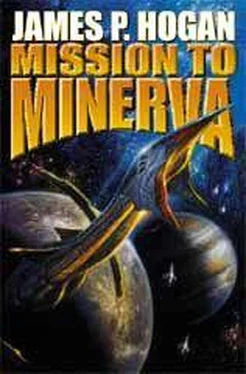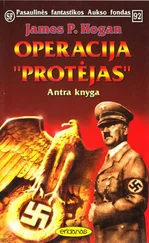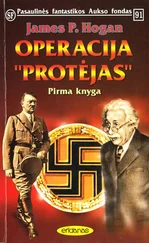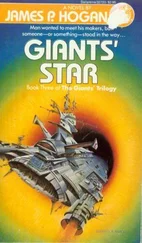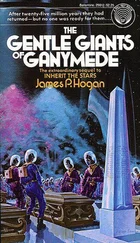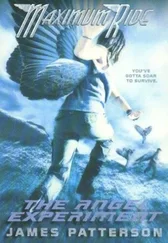Thurien architecture delighted in immense, soaring compositions of verticality, adorned with towers and spires, some of the larger cities extending upward for miles. A flying hotel lobby that looked like a flattened blimp from the outside but was burnished gold in color carried the arrivals to the city. Their first sight of it came before they were halfway there. It appeared on the horizon as a slowly growing cluster of whiteness and light, at first belying the distance by the suggestion being of some kind of monolithic structure. But as they drew closer and its true proportions revealed themselves, what had seemed to be facets of a single structure gradually unfolded and resolved into entire precincts of colossal frontages and vistas, terraced skyscrapers, canyons, and cliffs of architecture woven amid festoons of bridges and arcades around towering central massifs in a tapestry that sent the mind reeling. There was as much greenery as glass and sculpted stone filling the progressions of tiers and levels, with lakes connecting via a system of canals, and waterfalls constrained between the faces of buildings, while above, layers of cloud wreathed the topmost pinnacles. It wasn't so much a city, Hunt found himself thinking, as an artificial mountain range.
By the time the ray-shaped blimp brought them to what appeared to be the city's transportation center-or maybe just one of them-Hunt had lost track among the compositions of cityscape that they had passed between and over. They sailed into a vast, hangar-like space high in a stepped block of city vaguely reminiscent of an outsize ziggurat, disappearing below into a tangle of curving traffic ramps and lesser structures. From here, conveyances of every description seemed to come and go, from a web of tubes radiating from the lower levels like an integral circulation system built into the city, to streams of objects following the ubiquitous g-conveyor lines across the spaces above and between, which were as much a part of Thurien city-building as the edifices themselves. It was not always easy to tell what constituted a "vehicle," for pieces of the architecture seemed capable of moving and reattaching elsewhere. On leaving the blimp, the Thurien hosts took Hunt and his group down a couple of levels to a dining area for lunch. When they had finished, they emerged to find that the room had become part of their hotel. A little under thirty-five hours had elapsed by their watches since the Ishtar lifted out from orbit above Earth.
Earlier Terran guests had christened it the Waldorf. Originally provided for the convenience of Jevlenese making short visits to the city, it was designed to human proportions rather than Ganymean. Although it included accommodation, catering, recreational and other facilities, "hotel" didn't really describe it since it wasn't set up as a commercial venture. But it was near enough. The rooms had all the comfort and extras that Hunt had come to expect, including a full Thurien neurocoupler in each. There was also a section of cubicles for public use at the rear of the main entrance level, behind the lobby area. The gymnasium below included a gravitically sustained freefall pool where the water was spherical inside a trampoline-like elastic surrounding wall, and swimming combined with power diving became a whole new experience.
The main socializing focus seemed to be a sunken area of booths and seating alcoves set around a more open floor to one side of the lobby, screened behind planters and partitions and doubling as a bar and coffee shop. The sign in Jevlenese by the entrance gave it as the Broghuilio Lounge in recognition of their esteemed leader, but later Terrans, probably on account of its situation a few steps down from the lobby, had dubbed it the Pit Stop, which the Thuriens obligingly added in English. No arrangement had been made for the Terrans to see the Thurien Mutliverse work until the next morning. The rest of the day was for relaxing and acclimatizing. So after unpacking, freshening up, and settling in, it was to the Pit Stop that Hunt and the rest of the team gravitated, as well as others who had been on the Ishtar. The Thuriens who had been detailed to take care of them were either there already or drifted in later as time went by. It was a strange contrast that Hunt had observed before. Nothing ever seemed hurried or strained in Thurien day-to-day personal life. Yet when they put their minds to something like a construction or scientific project, the speed and efficiency with which they went about things could be astounding.
***
Preoccupation with rebuilding their culture back on their home world had reduced the numbers of Jevlenese coming to Thurien compared to those seen in times gone by. On the other hand, Terrans in some capacity or other were becoming a regular ingredient of life, so the demand for accommodation at the Waldorf was as brisk as ever. The Ishtar's complement had included a school group from Oregon on their way to summer camp on a world that had real dinosaurs; an Estonian choir that had been commissioned to give a series of performances across Thurien; and some technical support people from Formaflex Inc. of Austin, Texas, who were conducting an experiment on the economic effects of introducing Thurien matter-duplicating technology to Earth-the same outfit that Hunt's alter ego had tipped as an investment, which Hunt had passed on to his neighbor, Jerry. There were also some Jevlenese, but they tended to keep themselves apart, conditioned by tradition and upbringing to see Terrans as their implacable Cerian rivals.
Hunt found himself sitting with Sonnebrandt, Chien, and a Thurien called Othan, who was attached to the project at Quelsang in some kind of technical capacity. Sandy and Duncan had gone sightseeing around the city, Danchekker was away, checking something to do with the arrangements for tomorrow, and Mildred was making sure that the Waldorf staff were briefed on Lynx's foibles, aversions, and preferences.
As was the case with many Thurien materials, the table they were sitting at could be made opaque, transparent, and take on various textures. Currently it was glass-topped and functioning as a holo-tank, which Othan had been using to give them a visual tour of Thurios. The image contained in it now, however, was of the Quelsang Institute, where they would be going tomorrow. It was like a miniature version of Thurios, interconnected high-rise structures standing amid parkland and trees, but more curvy and exotically styled. Othan said it was named after a long-deceased Thurien notable. "Institute" was the term that Terran linguists had applied when nothing better really matched the original Thurien word.
"So what kind of a place is it?" Sonnebrandt asked.
"I'm not sure I know enough about Terran organizations to be able to compare it with anything," Othan replied.
"I met an Australian who was there, studying Thurien propulsion," Chien said. "He described it as a mix between advanced-physics research and teaching laboratories, and a philosophical academy."
"Who runs it?" Sonnebrandt asked. Othan looked perplexed.
"The administration sounds a lot less centralized than what we're used to," Chien said. "There doesn't seem to be much in the way of any coordinating policy."
"Different groups use the facilities to pursue their own programs, depending on what interests them," Othan said.
"So how are they coordinated? What unifies them in their approach?" Sonnebrandt persisted… Suppose they have different theoretical foundations. Or even contradictory ones. Would Quelsang be supporting all of it?"
Othan didn't seem to understand the problem. "Well, yes," he agreed. "How else would we find out which was true?"
"The Australian told me it was like a scientific artists' colony," Chien said.
Hunt couldn't make out whether she approved or not. The kind of tradition she was from would not have accustomed her to see the beneficial side, but from his previous dealings with Thuriens he knew something about how they worked. There was no Thurien Establishment to pronounce the approved consensus on a given subject, or any institutionalized reward system that would encourage conformity to it. Ideas either worked or they didn't; predictions succeeded or failed; evidence said what it said, regardless of anyone's preferences or preconceptions. Without political pressures or fears of losing face-which didn't especially affect Thuriens in any case-individuals left alone to make their own assessments in their own time would eventually come around to playing a part in an act that was going somewhere, rather than be left out in the cold with one that wasn't.
Читать дальше
